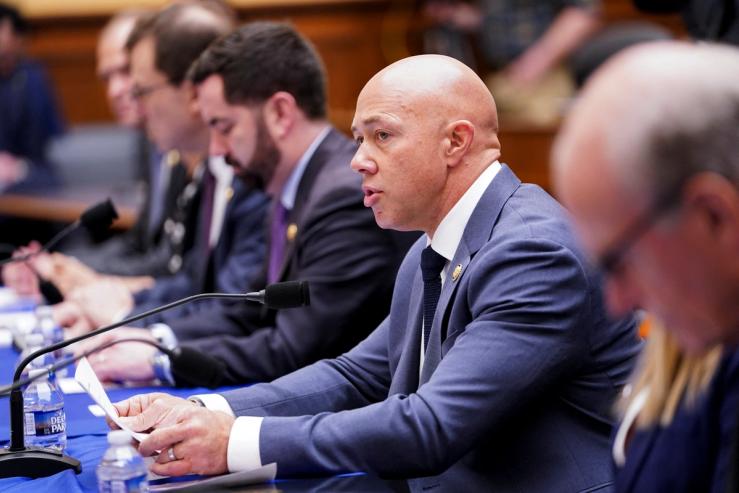what’s at stake
Tensions are running high between the United States and Venezuela after the Trump administration carried out a military strike on what it said was a boat carrying 11 drug smugglers belonging to a Venezuelan gang.
President Donald Trump and his allies say the strike as a warning to those looking to bring drugs into the US. Defense Secretary Pete Hegseth threatened other drug traffickers with a similar fate, as the US strengthened its military presence in the Caribbean this week.
The administration has provided little information — publicly or to Congress — about the legal justification for and intelligence behind the strike; it’s also not clear how Trump aides determined that the boat’s occupants were members of the Tren de Aragua gang.
And while the US military is historically involved in drug interdiction efforts, the strike itself launched a fresh debate about the Pentagon’s involvement in tackling counternarcotics.
In this article:
who’s making the case
Sen. Tim Kaine, D-Va., a member of the Senate Armed Services and Foreign Relations Committees, said that the administration may have overstepped by launching a strike on the boat, which allegedly killed all 11 on board:
“There is a role to play. I don’t think military hostilities and bombing is the way to do it. SouthCom has had assets related to surveilling shipments of drugs, directing the Coast Guard and others to interdict them, so the military has an important role to play. I got a bill passed in the defense bill last year that encouraged closer cooperation between the US and Mexican militaries on this issue. But I think cooperation is different than military strikes.”
“I haven’t yet seen an indication of why a military strike rather than an interdiction was the right call, but I’m posing those questions to the administration. They haven’t answered my questions yet. I’ll probably wait until I get some definitive answers before I completely say, ‘OK, here’s what they should have done.’”
Rep. Brian Mast, R-Fla., who chairs the House Foreign Affairs Committee, argued the strike represents the kind of “bold, decisive” action needed to combat “narco-terrorism”:
“Protecting Americans from designated Foreign Terrorist Organizations is a core responsibility of our government. The US military has long worked with the interagency to counter illicit drug trafficking, particularly in the Southcom AOR, providing established precedent for these actions. What we are seeing now from President Trump are the bold, decisive steps needed to put a stop to Venezuela’s state-backed narco-terrorism for good.
“The Maduro regime leads the Cartel de los Soles, which provides material support to groups like Tren de Aragua, a designated Foreign Terrorist Organization. Last week’s strike on 11 of those terrorists was well within the President’s constitutional authority under Article II.
“No one should shed a tear for these violent criminals who terrorize American communities. As for Maduro, he is on notice. The walls are closing in on his regime and his web of cartels.”
Notable
- Trump’s action has at least one vocal Republican critic in Sen. Rand Paul, R-Ky., and a Democrat supporter in Sen. John Fetterman, D-Pa., Semafor’s Burgess Everett wrote.
- Experts think the legal justification for Trump’s strike is mushy, CNN reported.
- The alleged drug boat “appeared to have turned around before the attack started because the people onboard had apparently spotted a military aircraft stalking it,” The New York Times reported.


